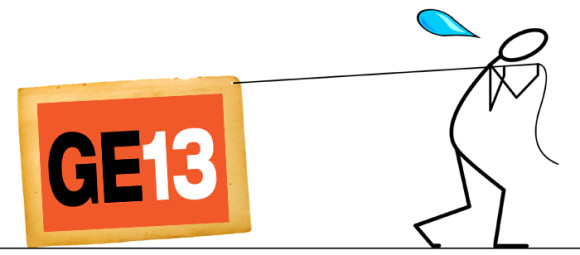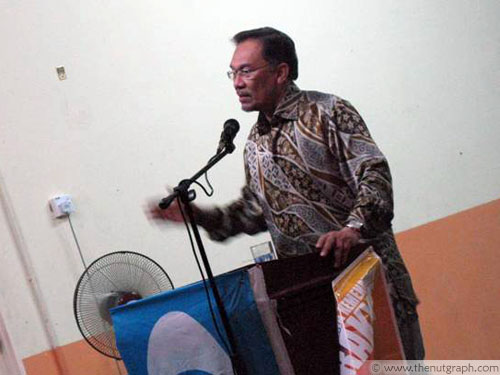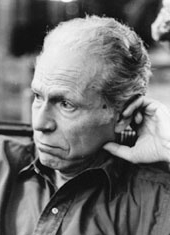
WE’VE voted. We’ve attended the rallies – whether the Himpunan Kebangkitan Rakyat before the elections, or the Black 505 protests after the polls. We’ve changed our Facebook profile pictures from yellow to black, from Arulchelvan to Adam Adli. We’ve shown that we want change.
But it’s hard to tell what has changed in the day-to-day practices of our politicians. The same faces lead the government and the opposition, and the classic partisan blame game still seems to be in fashion.
Now what? If we believe that the rakyat is the boss, surely there must be ways of pushing for some meaningful democratic change even though we haven’t had a change in government. How can we break out of these narrow and polarised political frameworks?
Political parties as brokers
It’s worth stepping back to look at politics and parties more broadly. One thing to note is that the rakyat is a terribly complex entity – varying not only in ethnicity and religion, socioeconomics and geography, but also in sentiment about any number of political issues, and in the intensity with which those opinions are held.
But most people, despite their distinct complexities, agree that we do share in at least some aspects of life. These may include social fulfilment in communities, and the provision of public goods like education and sanitation. So politics necessarily involves some amount of squishing individuals into groups and simplifying the differences between them.
In the modern state, elections are a central mechanism for aggregating citizens’ preferences. Elections are a mechanism of expression, in allowing citizens to have their say. They are also a mechanism of control, in defining the ways citizens can speak and how they are listened to.

Amid this loosely organised chaos, political parties step in as brokers. In Capitalism, Socialism and Democracy (1942), economist Joseph Schumpeter observed cynically, though perceptively, that: “Party and machine politicians are simply the response to the fact that the electoral mass is incapable of action other than a stampede.”
Parties and politicians offer a specialised service – they narrow down the range of political options, helping us to form groupings that are large enough to facilitate the functioning of the government we all share. In return, they receive income and influence, though they hold the latter in trust for their voters.
Routine politics vs contentious politics
Sometimes, a critical mass of citizens may decide that this political routine is failing to serve them. They find that the prevailing electoral and party systems are more costly than beneficial. Thus they challenge the political routine and break away from the established channels for voice to make shared claims on public space.
The Bersih rallies for clean and fair elections are local examples of such contentious politics. During cycles of contention, politics tends to be messier and less efficient, but far more possibilities open up.
Political practices and opportunities can change. Over the last few years, more and more Malaysians have learned how to use public protests as a way to challenge the political routine.
However, it seems like protests have become more and more a part of the political routine for the Pakatan Rakyat (PR), rather than a challenge against the Barisan Nasional’s (BN) zero-sum style of politicking.
This has been especially true over the last few weeks, as post-GE13 mobilisation has been dominated by political brokers behind the Black 505 rallies. The rallies and statements have come to take on the for-us-or-against-us tone of divisive electoral campaigns. Could this divisiveness be why support has declined?

At the 15th Black 505 rally, at Padang Merbok on 22 June, Anwar said: “Many have made the decision to not join us because of the weather. To those who are here, who understand the meaning of freedom, I salute you.”
The implication – that those who were not present did not genuinely appreciate freedom – was echoed in Anwar’s speech at the PR leadership convention the following day, in which he asserted that those within the opposition who accepted the results of the general election were in fact “the voices of Umno in Pakatan”.
Contrary to Anwar’s argument that those who give in to political fatigue are merely BN instruments, exhaustion is a typical part of cycles of contention, especially when the forms of mobilisation can be costly or risky. Ironically, once a type of protest gets normalised and the risk declines – as in the relative drop in police violence at Malaysian rallies – the payoff from such political mobilisation also drops, since the “I-was-there” thrill diminishes.
Still, Anwar’s caution against apathy was apt. Meaningful democratic change is far too important for us to go from asking “Now what?” to “So what?”
Leaders and followers
It is “Now what?” that the political brokers and we as private individuals, need to answer. But individuals, constrained by their limited political weight and resources, are compelled to rely on the brokerage of political parties if they want a say in the routine political process. This also makes it difficult for the rakyat to sustain challenges against political routine.
Nevertheless, it’s important to remember that politicians and parties are just as constrained, though in different ways. While they enjoy far more political clout than the average citizen, politicians stand to lose at least some popularity if they waver from a straightforward and consistent message.

Perhaps this is why they are liable to suffer from “the poverty of the imagination” – described by Albert Hirschman, in Shifting Involvements: Private Interest and Public Action (1985), as the inability to conceive of anything other than “radical change”, discounting the fact that most change takes place in “strictly limited advances, replete with compromises and concessions to opposing forces”.
Anwar’s all-or-nothing language against the GE13 results reflects such radicalism – but the clarity of his stance has been compromised by the fact that all opposition MPs have taken the parliamentary oath of office. For some voters, this may feel like watching your stockbroker picket a factory while continuing to invest your funds in that firm. While maintaining as many advantages as possible is a pragmatic strategy, it may cause some to mistrust his credibility.
Unlike politicians and parties, we private individuals have the freedom to choose a variety of affiliations at a variety of times, since our political satisfaction doesn’t depend on our individual political credibility. Although we’re forced into a narrow set of options when we’re voting, in all other political settings we’re at liberty to vocalise the full range of our preferences, whether or not they fit neatly with any party’s official position.
The challenge for us is to be more democratic than either the government or the opposition – in the hope that, over time, more and more Malaysians will align themselves along political positions that favour equitable flourishing for all the rakyat, and that our political brokers will follow our lead. ![]()
Hwa Yue-Yi likes this reminder from Terry Pratchett’s I Shall Wear Midnight: “If you do not know where you come from, then you don’t know where you are, and if you don’t know where you are, then you don’t know where you’re going.”


ellese says
A respectable write. Maybe the writer needs to dwell a bit deeper. He got many things right and if he did dwell further, he will realise that we have a systemic problem with the values of all our politicians be it BN and PR. The propagandas dished out by them are merely to promote their interest and not ours. We have been made to follow them but not them following us. Thus in almost all issues the right or wrong is determined by who one supports rather than the action. If I like the person who does it, then its right but if I don’t like the person the same act is wrong.
The writer is coming to that realization but not yet fully. He must dwell deeper that the behaviors and values of our politicians have been similar elsewhere and throughout history. Humans will only change their behaviors when incentives and disincentives or rewards and punishment of an act changes. Until then we get the same crap over and over again and people falsely believing they’re on a moral high ground.
Rom Nain says
A decent analysis. I have one query, though. In your third last paragraph, you assert that Anwar’s stance has been compromised by the opposition MPs taking the oath of office. Could you tell us what, in your opinion, would have been the best option for them to take under the circumstances and what possibly could have been the implication(s) had they taken that route? Cheers.
Yue-Yi says
Hi Rom Naim, I should say at the outset that I don’t think there are any ideal answers here, since any opposition party action could have complex and unpredictable repercussions, as you point out.
I think it’s absolutely right that the opposition challenged the fairness of the general election. It’s also right that opposition MPs have assumed office. But what is lacking is the language to explain their choices. I haven’t been able to follow each Black 505 rally in detail, so it’s possible that this was expressed clearly at some of the rallies — but I think it would make a huge difference if leaders across all Pakatan parties articulated, for example, that even though the electoral system is broken, the broader and overlapping political issues in Malaysia must be fought both within existing institutions (through the privileges of the elected positions they hold in trust for their voters, etc) and by challenging the injustices built into these institutions.
That sort of nuance would productively accommodate the apparent tension between opposition actions in rallies and in Parliament. Of course, nuance (as compared to black-and-white, us-and-them arguments) is difficult to convey to a variegated populace, but I think a lot of Malaysians are hungry for more nuanced politics, whether because we know that “jangan mengelirukan rakyat” is a terrible excuse, or because it’s increasingly obvious that Pakatan will need a lot of maturity and sensitivity to hold together.
Narayan says
Both Opposition and BN have filed election petitions and I am sure it is more than ten each and collectively it challenges a sizeable number of seats. So the Opposition used Black 505 rallies, that is only difference. So why is the broker EC still there? Both teams think something is wrong with the conduct of the election, right?
As for taking office, all those who think they have rightfully won, have taken their oaths and have respected the choice provided for the people in their respective constituency. This is being opportunistic or strategic, whichever the case it maybe.
All I see is a political stalemate, even though seemingly BN continues till GE 14.
Remember despite the court verdict, Bush Jr did not enjoy “legitimacy ” in his second term and was vilified and the more bravado he tried, the louder the voices of his detractors grew.
This is going to get worse. There are families split apart, with terrible stories floating around, like physical harm for supporting the opponent.
It requires thinking and feeling real hard, and then working on being a community again at ground level. There is not going to be any reconciliation at top level..
Pratamad says
Great analysis. While both sides (Anwar’s “ketuanan rakyat” vs. Najib’s “rakyat didahulukan”) have seemingly put the rakyat at the centre of their politics, it is by now obvious that the rakyat has failed to take it up as the master of the politics in the country. To put it bluntly, both sides have been exploiting the rakyat’s lack of political appreciation of their own agenda. It’s high time that the rakyat wake up to the reality and participate in the full political process, including the political parties. Not only should the rakyat choose their respective MPs every four/five years, they should participate in the selection of party leaders and candidates to stand in the GE. Joining a political party should not be a taboo or held as an act with ulterior motive, but simply to take back the ownership of the full political process. #RakyatkanPolitik !